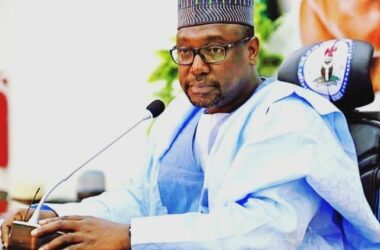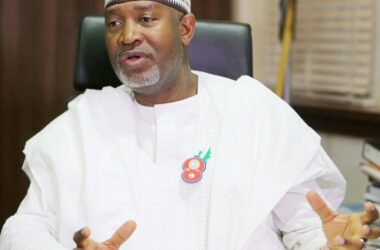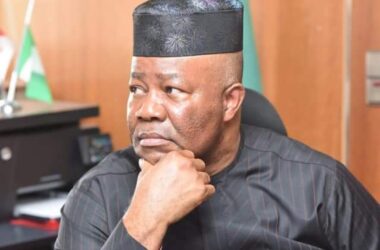Some days ago, a high-profile meeting took place at the Aso Rock Villa in Abuja, Nigeria’s seat of governance, between President Bola Ahmed Tinubu and Otunba Dr. Mike Adenuga, Chairman of Globacom Limited, a Nigerian multinational telecommunications company. While it was not clear what the purpose or content of the meeting was – whether of a private or official nature – this did not stop the swirl of speculation among observers, especially watchers of the Tinubu Administration in its early days in office, as it seeks to consolidate on its stated mandate and policy moves.
It may well have been a private tete-a-tete between the two men, a courtesy call of sorts, and their discussions may well have been entirely personal. Even so, it would be difficult to dismiss the significance of the occasion. Prior to Tinubu’s assumption of office, the two men have been reported to be at odds in the past (and at a point even needed the royal intervention of no less a personage than the Awujale and Paramount Ruler of Ijebuland, Oba Dr. Sikiru Olukayode Adetona, to smooth over the perceived rough edges in their relationship). If then, they are ready at this point in time to forgo whatever may have strained that relationship, such a rapprochement can only be motivated by a purpose higher than personal sentiment – say, the way forward for the nation and the improvement of its economic fortunes during the Presidency of Asiwaju Bola Tinubu. It goes without saying, afterall, than an Adenuga/Tinubu meeting anywhere and at any time can never be an ordinary tete-a-tete.
It would, therefore, be well within the bounds of reason to assume that the meeting between the head of the Nigerian state and the Chief Executive of one of the country’s corporate juggernauts was held to explore ways to position the private sector as a partner in the government’s quest to rejuvenate the Nigerian economy, not just in the short-term task of finding the quickest possible path to recovery from the current slump, but to join hands in molding the building-blocks for a durable socio-economic edifice that will stand the test of time.
Such an agenda could not be more timely. It goes without saying – and experts over the years have made the point repeatedly – that the country’s transition from a public-sector (ie a government)-led economy to a private sector-led version is long overdue. They have identified a number of features of a government-driven economic profile that tend to impede growth – such as bureaucratic bottlenecks; wastages in governance; and the continued maintenance and subsidizing of unprofitable (indeed loss-making) business ventures, usually for reasons that have nothing to do with economics. The way to fast-track economic growth, these experts insist, is to infuse the economic life of the nation with the spirit of the private sector – with its emphasis on efficiency, effectiveness, timeliness and insistence on verifiable results.
If the President’s aim in hosting Dr. Adenuga on this occasion was to solicit the support of Corporate Nigeria in bringing about this transition, perhaps the Globacom Chairman was also in Aso Villa to remind the powers that be that, for this transition to work and to achieve its objectives, the government must (beyond mere propaganda) demonstrate genuine commitment in making 3 basic things clear to all stakeholders: the goal, the path to the goal, and the enablers or facilitators on the journey towards the goal. In other words, government’s growth plan must prioritise 3 things: First, commit to helping businesses – be they multinational companies like Globacom Limited or individual entrepreneurs, to provide jobs and deliver goods and services in an efficient and timely manner. Second, improve market access by building infrastructure, by rewarding investment and private enterprise, and by giving poor people the opportunity to make better use of local and international markets. And third, enhance competition by tackling clearly-identified impediments to growth such as corruption, excessive regulation and weak infrastructure (especially in the area of transportation).
The so-called ‘saner climes’ (a term we use to describe entities which have successfully developed their economies via the private sector route), all have some character traits in common. One of them is strong political leadership undergirded by impersonal and impartial institutions anchored on the rule of law; reformed and goal-oriented civil/public services, and aggressive enterprise development agencies and measures, to name just a few. According to the United Kingdom’s Department for International Development (DFID), countries that have shifted to private sector-led models – through economic liberalisation – have seen increased GDP growth which has led to a significant reduction in poverty.
So far, Nigerian governments have been very good at goal definition – even to the point of advocating a private-sector-led economic model themselves. But when it comes to charting the path and, more importantly, putting in place and empowering the enablers and facilitators for the attainment of the stated goal, government always falls far short.
That has to change. The failure of Nigeria’s experiment with modern economic management has been, for the most part, due to policy summersaults, multiple taxation, infrastructural paucity, official corruption, protracted litigation and other symptoms of a broken jurisprudence, and an unfriendly business climate. To make matters worse, these self-inflicted actions have, in recent years, been compounded by worsening internal insecurity as well as external factors such as the adverse impact of the Covid 19 pandemic and the war in Ukraine.
There is nothing the private sector (including local and foreign investors) love to see more than visionary leadership at the top of national and subnational entities; strong institutions; heavy investment in infrastructure as well as in human capital development; and the radical transformation of the civil/public service. As daunting as these changes may sound to the average Nigerian, the experience of previously low-income economies around the world (in Asia, such as Singapore and Malaysia, and in Africa, such as Ghana and Rwanda) means that such a transition is entire doable. Not easy, but doable – given the political will.
What are the benefits of a private sector-led economy for Nigeria, and what can entrepreneurs like Dr. Mike Adenuga, and enterprises like Globacom Limited, do to help the economy maximize these benefits? According to a report from the International Finance Corporation (a division at the World Bank) which focused on the health of Nigeria’s economy, a broader private sector-led growth strategy would enable Nigeria not just to realize its immense potential, but scale it up tremendously by attracting more investment and creating millions of quality jobs for its growing population. Known as the Nigeria Country Private Sector Diagnostic (CPSD), the report has called on the private sector to place greater emphasis on addressing infrastructure deficiencies and investment policies in their quest for a more conducive business environment, while also identifying high-impact sectors such as agribusiness, manufacturing and digital entrepreneurship, among others, because of their ability to speed economic growth and job creation in Nigeria. Small businesses in particular, the report adds, will require improved policy frameworks and reforms to pivot the economy away from its current over-dependence on earnings from crude oil and make the most of the country’s extensive agricultural and mineral resources, its young and entrepreneurial labor force, and its strategic position in Africa, with market access to other markets in the West African sub-region.
Within the first three months of its assumption of office, the Tinubu Administration has, though its initial actions, stated positions on the most consequential economic issues, and even in texture of its appointments, indicated its readiness and willingness to make the transition happen.
But is Corporate Nigeria ready to play its part?
Perhaps that was the gauntlet President Tinubu sought to throw down before Dr. Adenuga (and by extension, other key players in the real sectors of the Nigerian economy) at their Abuja meeting.
And what could the Globacom boss’ response possibly be?
There is no better indicator of Adenuga’s hypothetical response as to whether the private sector was ready to take up the gauntlet of the country’s quest for a private sector-driven economic model than the organization he built and nurtured over the years in the face of many odds.
Globacom Limited (known simply as Glo) has, since its founding in late August 2003 scaled new heights in pursuit of its overarching goal ie to build Africa’s biggest and best telecommunications network. Early on in its operations, the company made history as the first single company to build a high-capacity sub-marine fibre-optic cable, popularly known as Glo-1. It was the first successful submarine cable running from the United Kingdom to Nigeria – which enabled the service to record high increases in internet speeds and download rates with resultant significant improvements in online technologies for its teeming customers and clients. Glo-1 also improved teleconferencing, distance learning, disaster recovery and telemedicine, among several other benefits for millions in Nigeria and her West African neighbours.
With a workforce of over 3,500 people worldwide, Glo can boast of roughly 60 million subscribers in Nigeria alone, making it the second largest network operator in the country. And its annual revenue, which has consistently been in excess of $2 billion, is nothing to sniff at, either.
Apart from the Glo 1 service, the company boasts of the popular Glo Mobile buiness unit. Glo Mobile grew from one million subscribers in over 87 towns in Nigeria and over N120bn in revenues in its very first year, to the point where, now, it has spread to other African countries, notably Benin and Ghana.
Nigerians will recall with a sense of pride that upon its appearance on the scene in August 2003, Glo Mobile introduced lower tariffs and the then-revolutionary pay-per-second billing, alongside other value added services, which the competition had declared impracticable at the time. Its capacity for innovation and efficiency made it a market leader in a relatively short period – even though it was the fourth GSM operator to launch in Nigeria.
Among the company’s innovative services are as follows: The Glo Fleet Manager (a vehicle tracking solution which helps transporters/fleet operators manage their fleet); The Glo Mobile internet service which provides subscribers with access to customized internet sites for mobile phone browsing; The popular Blackberry prepaid service which gives subscribers options to pay daily, weekly or monthly for the service – as well as free access to the yahoomail and the Blackberry Messenger; and the 3G high-speed internet services through the sale of its 3G modem.
Globacom’s social interventions over the years have been no less innovative and impactful. Its extensive sponsorship profile spans the worlds of sport, culture, entertainment and media – not just in Nigeria but also elsewhere in the sub-region. Among its signature interventions in sports alone are the Confederation of African Football’s Glo-CAF African Player of the Year Award; the the Glo Lagos International Half-Marathon; the Nigerian Premier League; the Nigerian National Football Teams; the Nigeria Football Federation (NFF); the Glo People Police Marathon; the Eyo Festival; the Ojude Oba Festival; the Glo Ghana Premier League and the Ghana National Football Teams; and Manchester United FC in the English Premier League (which entails bringing young players from Benin, Ghana and Nigeria to Manchester to train at the club).
In media, Glo remains till date the sole sponsor of the half-hour programme, African Voices on the international TV network, CNN – in line with both the company’s and the programme’s objective to project game-changers on the African continent as well as also promote the Globacom brand globally.
In the world of entertainment, Glo has carved an enviable niche for its innovative practice of engaging the promotional services of celebrities and youth icons as Brand Ambassadors, as well as for its numerous collaborations with industry stakeholders on various platforms, notably the popular music channel, MTV.
In light of the foregoing, perhaps President Bola Tinubu did not need to ask his guest the question of what the private sector was bringing to the table in making the transition that would kick-start Nigeria’s economic turnaround. Having himself straddled the worlds of business, politics, governance and economic management all these years, he is certainly no stranger to the strides of corporate players like Glo, and the transformational role the private sector can yet play in the economy. As President-elect, he even alluded to the role of men like Adenuga in national growth in his goodwill message during the latter’s 70th birthday celebrations earlier in 2023, in which he lauded the Globacom Chairman’s unwavering commitment to nation-building, and for his many social and economic investments in Nigeria. Calling him a true believer in the manifest destiny of Nigeria as a great country, Tinubu also cited Adenuga’s other accomplishments in the oil, real estate and aviation sectors. The businessman, Tinubu said, democratised and revolutionised GSM telephony in Nigeria with that per-second billing masterstroke in 2003 – at a time when Nigerians thought they were going to be stuck with per-minute billing for the foreseeable future. .
In the process, said Tinubu, the celebrant and his brand have not just created jobs and livelihoods for thousands of Nigerians and Africans, but helped to domicile real, enduring wealth within the shores of his motherland.
That, in a nutshell, is the power the private sector has. Imagine, then, the potential that would be unleashed when a visionary government sets about creating the enabling environment in terms of a common-sense (and indeed progressive) regulatory environment, as well as tangible and intangible incentives for businesses such as Glo, or even startups, to do what they do best!
Perhaps that was the nexus the Awujale of Ijebuland, HRM Oba (Dr.) Sikiru Adetona sought to actualize when he threw his hefty weight behind the rapprochement between these two illustrious sons of O’Odua. Our people say what an old man (read: a royal father) sees while seated on the ground, a young man (read: people with limited worldviews and agendas, including politicians) will not see it even if he climbs to the top of an iroko tree.
That said, may we add that as government ponders the role of the private sector in the economic regeneration of our country, perhaps it should also consider making provisions for a more robust engagement with the traditional institution, as a catalyst for the cultural and moral re-orientation of our society and the recovery of our collective soul as a people.






